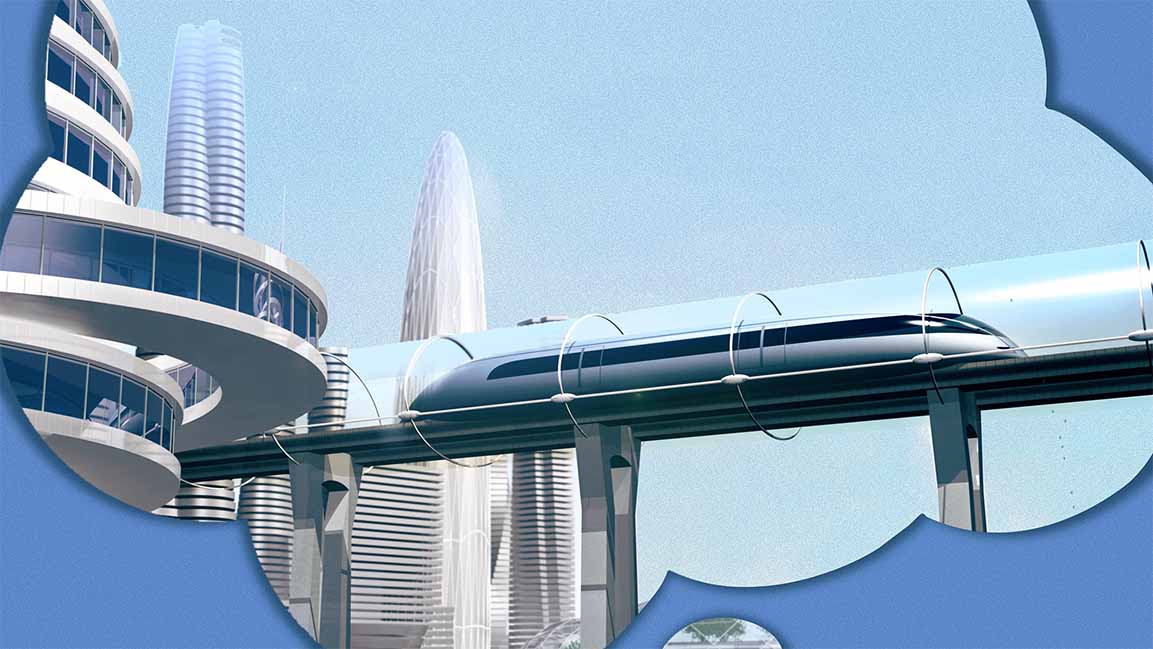- | 9:00 am
Hyperloop may be dead. But its dream in the Middle East is not
A step towards a bold investment in sustainable, high-speed transportation

In 2013, Elon Musk captured the world’s imagination with his ambitious vision of the hyperloop—a revolutionary transportation system featuring capsules gliding atop an air-bearing surface within a low-pressure tube.
A decade later, Musk’s assertion that the hyperloop could usher in the “fifth mode of transportation” and transform our lives, work, trade, and travel now appears to have failed.
However, while most have shifted focus from the hyperloop dream, the Middle East continues to invest in this futuristic vision.
The region is a promising market for hyperloop due to the high demand for rapid and efficient transportation and countries actively diversifying their economies, says Mars Geuze, Chief Hyperloop Officer, Hardt Hyperloop.
THE MIDDLE EAST – A SUCCESS STORY?
The densely populated region has a booming economy and demonstrates a need for ultra-high-speed inter-city connection, says Sebastien Gendron, Co-Founder and CEO, TransPod Inc.
“Several Middle Eastern countries are highly motivated to adopt the best technologies for residents to drive job creation, boost employment rates, and improve living standards.”
The Middle East, especially the UAE, was among the first regions globally to express interest in the hyperloop concept. “We conducted a feasibility study to connect Abu Dhabi with Al Ain some years ago,” says Andrés de León, CEO of Hyperloop Transportation Technologies, a Los Angeles-based company with offices in Dubai.
Regarding routes being considered in the region, he adds, “We are currently in discussions with multiple countries in the Middle East, and we continue working on analyzing different alternatives in the region.”
Geuze adds that several regional governments are closely monitoring the market and the progress of hyperloop technology with keen interest. “This indicates a willingness to explore and potentially invest in hyperloop projects when the conditions are right.”
Gendron also points out that TransPod is considering routes throughout the UAE and Saudi Arabia and is actively discussing with stakeholders in both countries.
In the UAE, this could include connections between Dubai, Abu Dhabi, and Al Ain, as well as the airports throughout the country. In Saudi Arabia, potential connections might include routes between Dammam, Riyadh, Mecca, Jeddah, Madinah, and NEOM.
ADAPTING HYPERLOOP IN THE MIDDLE EAST
According to Geuze, hyperloop technology is well-suited to address the specific challenges of the Middle East – managing extreme temperatures by incorporating expansion joints and advanced thermal management systems.
“Hyperloop is inherently suitable for long-distance travel between cities. Moreover, the guideway infrastructure can be adapted to local variations, integrating seamlessly with the regional environment on a case-by-case basis.”
It is easier to maintain the hyperloop’s tube and vacuum systems than rail across long distances of high heat and sand, adds León.
Gendron says infrastructure design accounts for individual geographies’ disparate climate conditions, needs, and future-proofing as the climate changes. “It’s not a one-size-fits-all solution but a tailored approach to the unique conditions of each geography.”
IT’S A SUSTAINABLE TRANSIT
Running on alternative fuels like solar and wind, Hyperloop can generate more energy than it consumes. León says, “Hyperloop is the most sustainable form of transportation.”
Geuze adds that hyperloop consumes approximately ten times less energy than aviation and roughly two times less energy than traditional rail systems. Solar panels can be placed on top of the hyperloop infrastructure to enhance sustainability, reducing reliance on conventional power sources.
“In the Middle East, we’re in discussions with various clean energy developers to ensure we can either access existing sustainable energy developments or finance new developments alongside our infrastructure and use that energy to power our system in the future,” says Gendron.
And while there is ample space for high-speed rail and aviation, León says the hyperloop offers several advantages in sustainability, operating cost, safety, and speed.
Another advantage, according to Gendron, is that the TransPod system, designed for over 1000 km/h, is an ultra-high-speed ground transportation system for passengers and cargo. It travels faster than a jet and three times as fast as a high-speed train.
Also, regarding investments, León believes that hyperloop will thrive with public-private partnerships. This involves the private sector working alongside government regulators and transportation authorities.
MIDDLE EAST’S LEAP WITH HYPERLOOP
For León, hyperloop is uniquely poised to solve many challenges in the Middle East. Connecting the region’s major urban centers with hyperloop will stimulate and grow economies. “In multiple studies conducted with governments and auditing organizations, it is evident that the economic benefits of building hyperloop systems far surpass those of constructing more freeways or traditional railways.”
Hyperloop technology can play a pivotal role in the broader vision for economic development and infrastructure improvement in Middle Eastern countries, adds Geuze.
By efficiently connecting major cities and regions, hyperloop can facilitate the movement of goods and people and create job opportunities.
Moreover, building a local hyperloop industry provides an opportunity to capture a share of the massive global upcoming market for hyperloop. This fosters regional growth and strengthens the region’s position on the world stage as a leader in innovation and forward-thinking infrastructure development.








































